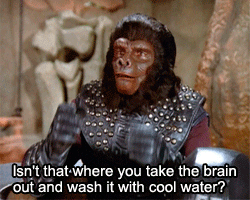Originally posted by Daily
No, I don't expect any such policy to ever be democratically viable in multi-cultural countries, only through authoritarianism/fascism/gulags. I think they can be democratically viable in states which are already ethnically homogeneous (obv)
So do you endorse anti-democratic governance as a means to your desired end or do you just want something you know you can't have?
By cultural homogeneity, I'm referring to law (e.g. no marrying 14 year olds), religion/secularism (e.g. no sharia courts)
Well this is already the norm in western countries. Religious diversity is tolerated but except with very limited exceptions (like you can wear a kippah but not a cap in a drivers license photo or some shit), the state's law takes precedence over religious law.
customs (e.g. no blood feuds, if we're in Japan, we bow, if we appreciate the union between man and woman, don't be using faggotry as your identity, no offering a toast with an empty glass, etc).
So how do you see this playing out? Do you think the state should take a hand in the practice of local customs? You might say unity in observing customs will follow naturally by the effort to eliminate introduction of foreign culture by immigration but that's not the only force that drives cultural diversification. Access to foreign media and goods can also change cultural attitudes, and even in wholly isolated societies, spontaneous cultural divergence can happen (things like the pledge of allegiance here in the US have gone from "custom" or "controversial" in the eyes of the "native" population, not because of cultural dilution but because of an internal shift in attitude towards the state). What do you propose to do when Yamamoto-san doesn't want to bow anymore? What does a liberal democratic ethnostate do to preserve its cultural unity when one half of its country is industrialized and the other half is agricultural and their divergent interests cause different values to emerge in each population?
Mind you, I'm not saying these are unanswerable questions but it seems like you either need to step away from the claim to liberal democracy or limit the state's ability to create cultural homogeneity to fairly indirect potentially ineffective strategies.
If somebody can emigrate and "integrate efficiently enough so as to not draw negative unnecessary attention to themselves" then there shouldn't be a problem
Again, that's nice to say but what exactly would it look like in an immigration policy? Immigrants sign a waiver that they won't attract "negative unnecessary attention"? What happens when they do something that makes some of the native population mad but doesn't offend the rest like, say, wearing a hijab in a country where that's not the custom? When does ensuring cultural unity turn into being the anti-liberal fashion police?
I bet you're going to try and make this even more complicated then it should be, Lanny
It's not
I mean you say that but it does seem simple on the policy level. I think you're over-simplifying it. But if it really is simple you should have simple answers to these policy issues, but I don't see them.


